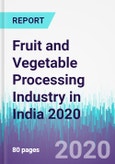Market insights:
In FY 2019, ~8.31 Mn tons of fruits and vegetables were processed in India, which is expected to reach 16.39 Mn tons by 2024, expanding at a CAGR of ~14.84% during the FY 2020-FY 2024 period.
The Indian fruit and vegetable processing industry experiences a conducive growth environment, owing to the abundant supply of raw materials and favorable government policies like Pradhan Mantri Kisan Sampada Yojana (PMKSY). Rising consumer affordability and rapid urbanization resulted in lifestyle changes, following which the preference for processed fruits and vegetables increased substantially.
Nevertheless, several factors like the lack of required infrastructure, and higher cost of processed fruits and vegetables are the major hurdle to the growth of the industry.
Technology insights:
The industry is witnessing an increased application of innovative technology to increase productivity. Artificial intelligence (AI) is being implemented to examine fresh fruits and vegetables for defects, and accurately predict the exact date of decay. Nanotechnology is aiding in maintaining the freshness of perishables. Furthermore, grading robots are used to evaluate the quality of the produce to minimize manual errors. Cold plasma, high-pressure processing, irradiation and radio frequency identification (RFID) are technologies that are mostly used in the fruit and vegetable industry in India.
Competition analysis:
The market is highly fragmented with a more significant presence of the unorganized sector, mainly in the pickle producing segment. The organized industry comprises large and established players with a diverse product portfolio. A few of the significant players include Dabur India Limited, ITC Limited, Hindustan Unilever Limited and Mother Dairy Fruit Vegetable Private Limited. The industry is witnessing a rise in the number of foreign players as well, owing to significant growth opportunities. Some of the tech start-ups in the Indian fruit and vegetable industry include Ecozen Solutions Private Limited, Rakyan Beverages, Raav Techlabs Private Limited and Nutricane Beverages Private Limited.
Companies covered:
- Dabur India Limited
- ITC Limited
- Freshtrop Fruits Limited
- Hindustan Unilever Limited
- Tai Industries Limited
- Capricorn Food Products India Limited
- Cremica Food Industries Limited
- Fieldfresh Foods Private Limited
- Mother Dairy Fruit Vegetable Private Limited
- Shimla Hills Offerings Private Limited
Table of Contents
Companies Mentioned
- Dabur India Limited
- ITC Limited
- Freshtrop Fruits Limited
- Hindustan Unilever Limited
- Tai Industries Limited
- Capricorn Food Products India Limited
- Cremica Food Industries Limited
- Fieldfresh Foods Private Limited
- Mother Dairy Fruit Vegetable Private Limited
- Shimla Hills Offerings Private Limited








